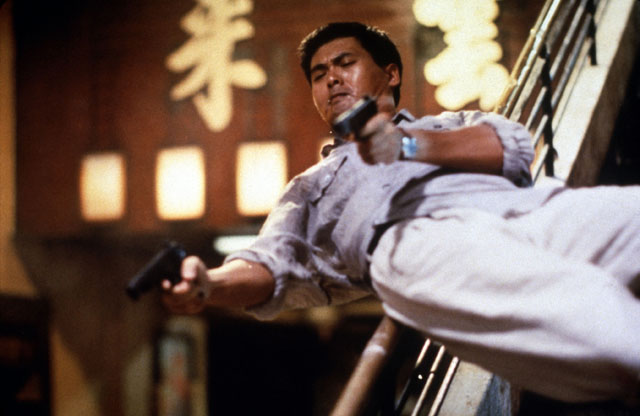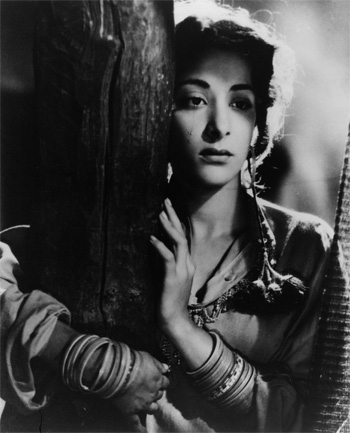The 15th edition of Filmmaker‘s “25 New Faces of Independent Film” actually features 37 new faces—directors, producers, cinematographers, screenwriters, actors—and it’s a pretty international and well-travelled bunch. From the introduction: “Amidst talk of collapsing business models, it’s downright inspiring to profile filmmakers whose proactivity knows no bounds.”
Rumsey Taylor and Leo Goldsmith introduce a new feature at Not Coming to a Theater Near You: John Woo “has become so known—appropriately so—for his visual signatures that is important to note, in our survey of his work in the Hong Kong action genre, that his aesthetic is more robust and considered than what a cursory pass may reveal.”
From Emissions in the Dark: “I love The Caravan, but Aseem Chhabra‘s lament in this month’s issue about the nonrecognition of contemporary Indian cinema by the West is severely misleading, misguided, full of self-pity and excuses about that perennial Indian condition of barely falling short of universal success/acclaim not due to any lack of effort or talent, but you know, kismet. So, he never pauses to ask whether the Indian films at Cannes this year or the recent indie Hindi films are actually—gasp!—good. Or even more basically, what the cultural production of art films funded by Western film festivals and the straightjacket of film criticism might mean for the export of Indian films under the umbrella of national cinema.”
David Cairns in MUBI’s Notebook on Pierre Chenal’s Le Dernier Tournant (1939), the first adaptation of James M. Cain’s The Postman Always Rings Twice: “[R]emarkably enough, this version of the story is as gritty an adaptation as any of them, even allowing for Lana Turner’s torpedo-bikini in the Garnett version, the graphic body hair of the Visconti, the blasted industrial landscapes of the Feher and the rowdy kitchen table intercourse of the Rafelson.”
Jon Boorstin on Abel Gance‘s Napoleon (1927) in the Los Angeles Review of Books: “This was silent film in its purest form: not story, not argument. The audience mainlines pure emotion.”
Berkeley. The Pacific Film Archive’s Jason Sanders introduces a gorgeous browse: “Our much-anticipated Raj Kapoor series, The Eternal Poet: Raj Kapoor & the Golden Age of Indian Cinema, starts this evening with one of his greatest-looking films, Barsaat, and what better way to celebrate than by spotlighting one of the more under-appreciated elements of Kapoor’s films: their visual beauty.”
New York. “Ultimately, The Clock is a signature artwork of our archival age, a testament to the pleasures of mechanization (and now digitization),” blogs Meghan O’Rourke for the New Yorker. “It’s an experience, I suspect, that would be nearly entirely illegible to an eighteenth-century time traveller who, curious what modern-day New Yorkers were all wound up about, wandered into line.” More from Genevieve Yue, writing for Film Comment: “In his essay ‘A Pentagram for Conjuring the Narrative,’ the avant-garde filmmaker Hollis Frampton describes a nightmare recounted to him by a friend: first the filming of a woman’s entire, illustrious life, then the man doomed to watch it, her life eventually consuming his. For Frampton, narrative films presented a set of restrictions, a trap; freedom meant understanding the laws that indisputably govern the movies—continuity editing, convention, and, of course, time—as arbitrary constructs, rules that can be bent and broken. It’s not a vision of cinema that the self-proclaimed film illiterate [Christian] Marclay shares.”
Los Angeles. “LACMA’s ongoing French film series on Fridays this month is offering a notable slew of double features, comparing and contrasting rarely screened classics,” writes Doug Cummings in the Weekly. “Coming on July 20 are blistering social critiques from cinematic auteurs Robert Bresson—The Devil, Probably (1977)—and Luis Buñuel—The Phantom of Liberty (1974).”
Chicago. The Reader‘s J.R. Jones: “Besides Batman, what to see this week.”
Berlin. “The summer Tarkovsky retrospective is a tradition that has grown dear both to us and our audiences over the past 20 years.” And it begins this weekend at the Arsenal.
In other news. Vulture‘s Matt Zoller Seitz comments on this year’s Emmy nominations.
In the works. Claire Denis will begin shooting Les salauds (The Bastards) with Vincent London and Chiara Mastroianni next month, reports Cineuropa‘s Fabien Lemercier.
Park Chan-wook’s Stoker, featuring Mia Wasikowska, Matthew Goode, Dermot Mulroney, Jacki Weaver, and Nicole Kidman, will be released on March 1, 2013, reports Sophia Savage at Thompson on Hollywood.
For news and tips throughout the day every day, follow @KeyframeDaily on Twitter and/or the RSS feed. Get Keyframe Daily in your inbox by signing in at fandor.com/daily.





